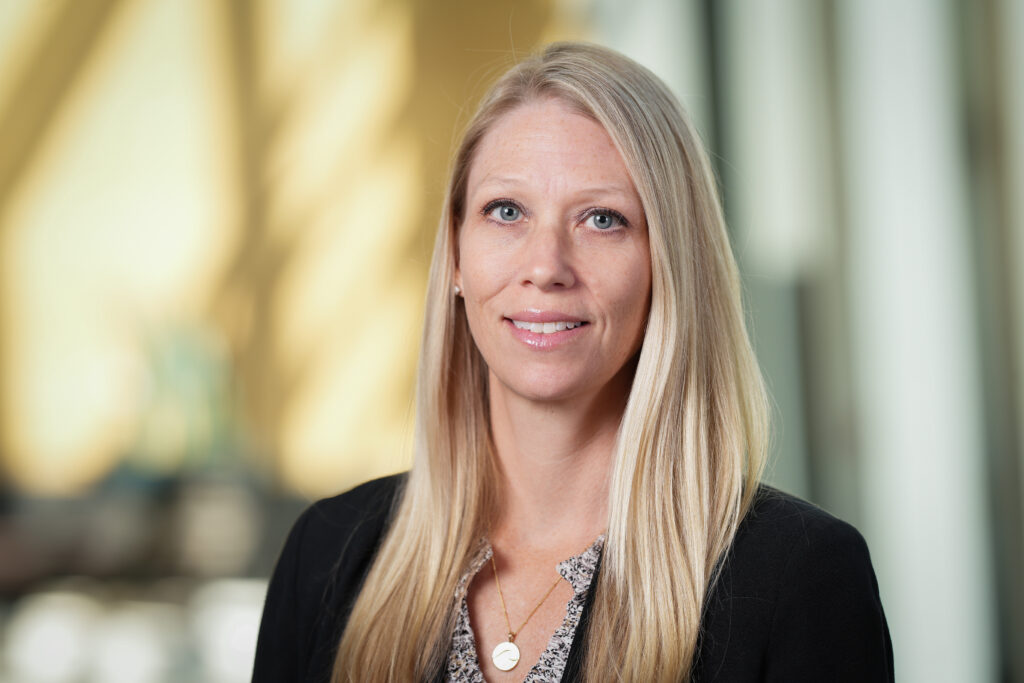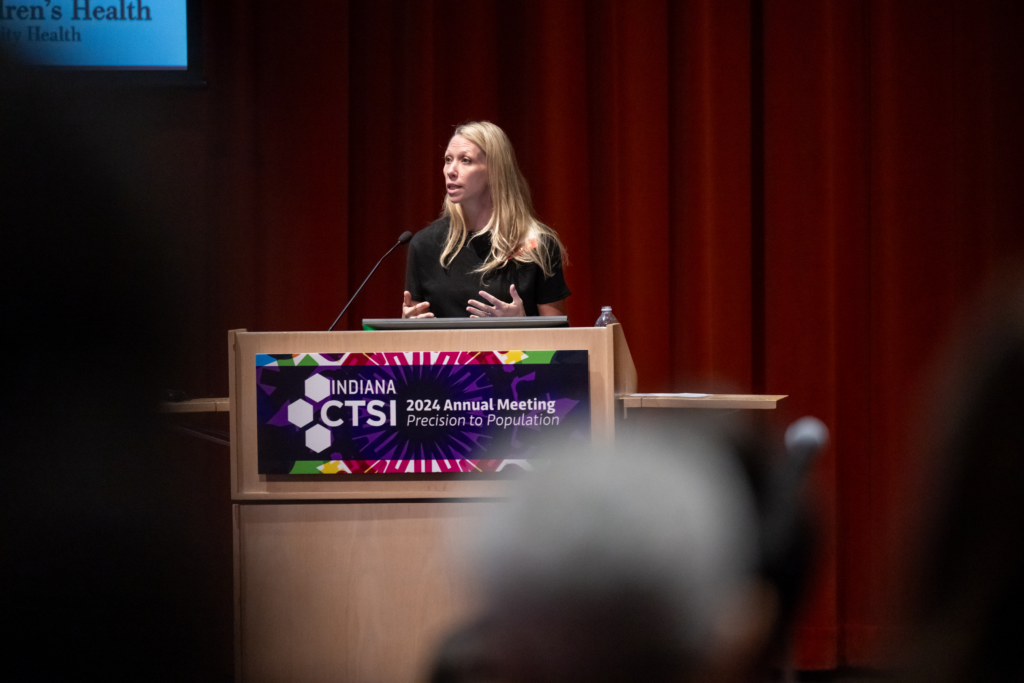Emerging Leader: Rebecca McNally Keehn, PhD

For the first ten years of her career, Rebecca McNally Keehn, PhD, was focused on providing clinical care. As a pediatric clinical psychologist, she also educated other clinicians and trainees on best practices for the assessment and diagnosis of autism.
During this time, McNally Keehn was involved in research, and saw how essential research was to enhancing clinical services for kids and families. But she resisted thinking of herself as a researcher until her mentor, Nancy Swigonski, PhD, who is now a professor emeritus of pediatrics and public health, changed her mind.
“She said to me, ‘You are a researcher, and you are meant to do this work,'” McNally Keehn recalled. “That meeting will forever be etched in my mind. It changed the trajectory of my career and my whole life.”
Today, McNally Keehn is an autism health services researcher and an assistant professor of pediatrics at Indiana University School of Medicine. She is a former Indiana CTSI K12 Scholar, and is the recipient of multiple major grants from the National Institutes of Health (NIH) including an R01. She is making an impact on autism health services research both in Indiana and internationally, with expansive projects in Kenya and a developing research partnership in India.
No doubt about it: Swigonski was right, and McNally Keehn is a researcher. But she says that those first ten years of her career as a clinician were important in shaping her research interests and priorities.
“Those experiences really drive my passion and my priorities in this work today—which are finding and testing solutions for families to access services that support positive developmental outcomes for their children,” she said.
McNally Keehn’s work has contributed “substantially and meaningfully” to the field of autism spectrum disorder research, said Sarah Wiehe, MD, MPH, who is co-director of the Indiana CTSI.
Finding and Testing Solutions
Children and families in Indiana and elsewhere experience significant challenges in accessing autism services, particularly if they are minoritized or live in rural or resource-constrained areas, McNally Keehn said. Delays in assessment and diagnosis lead to delays in intervention services for those who need them, and this translates to poorer outcomes.
McNally Keehn’s work bridges these critical gaps in access, and connects kids to services earlier in their lives.

She is co-director of the Early Autism Evaluation (EAE) Hub System, a statewide, tiered system that builds capacity for developmental screening and diagnostic evaluations for young children in primary care settings. In 2023, McNally Keehn and her collaborators completed a study demonstrating that the system offers a valid, compelling, and scalable model for increasing access to those services. They published their findings in Pediatrics. (Read the IU School of Medicine news release)
Now, McNally Keehn is expanding significantly on this work in collaboration with her husband, cognitive neuroscientist Brandon Keehn, PhD, of Purdue University. They are studying and deploying tools that measure biomarkers for autism in primary care settings in Indiana and beyond.
“Our shared work is in translated biobehavioral approaches to move solutions from basic science in the lab, to clinics, to communities,” she said.
At the Indiana CTSI Annual Meeting in 2024, they presented their work demonstrating that eye-tracking tools can help primary care clinicians make earlier, more accurate autism diagnoses, particularly in children whose autism may be undetected by other measures.
In the fall of 2024, McNally Keehn received an R01 grant to deploy and study these eye-tracking tools in western Kenya.
McNally Keehn says she “never envisioned herself as a global health researcher,” and is grateful to the Indiana CTSI for introducing her to global health research. In addition to the Kenya project, she has also received a grant from the Indiana CTSI to develop a similar reciprocal innovation partnership in India.
“What we learn in each setting only strengthens our work in the other setting,” she said. “It’s a true demonstration of reciprocal innovation.” (Learn more about Global Health Reciprocal Innovation)
Laying a Career Foundation with the Indiana CTSI
Wiehe, who has mentored McNally Keehn and collaborated with her on several health services research projects, described her as an “exceptional, bright, innovative, and highly motivated researcher.”
“[She has} demonstrated an impressive capacity to integrate foundational training in traditional research methodologies with clinical expertise to formulate and carry out her transformative research ideas,” Wiehe said.
McNally Keehn credits the Indiana CTSI with helping her launch her research career.
“I have been extremely fortunate to have had multiple CTSI programs and awards over the past few years,” McNally Keehn said.

The R21 grant that funded the EAE study published in Pediatrics was a result of pilot funding she received in 2018 from a Project Development Team. After that, she sought out the K12 program to get additional training in health services research, participatory research, and implementation science.
Her year in the program was productive and transformational. As a K12 scholar, she wrote four R01 proposals and multiple other collaborative grants, she said, several of which were funded, and led to her leaving the program early to pursue her R01 project.
“The protected time and training that the K12 gave me was a really important turning point in my career,” she said. “Without that training, mentorship, and protected time, I wouldn’t have been able to accomplish those things.”
Samir Gupta, MD, who directs the K12 program, praised McNally Keehn for her work as a K12 scholar and her success in laying a foundation for her independent NIH applications.
“The K12 program is proud to have played a role in Dr. McNally Keehn’s ongoing success in obtaining federal funding and continuing her important research to help children here in Indiana and around the world,” he said.
The Path Forward
As McNally Keehn looks to future projects, she is committed to understanding how best to optimize training for primary care clinicians to provide autism evaluation services. She wants to build their capacity to do this in the community, and do it in an efficient, individualized, and precision-focused way, she said.
She is grateful to the “amazing team of colleagues” she works with, from research coordinators to students and trainees at all levels.
“Without them, this is not possible,” she said.
She also encourages trainees and junior colleagues to take risks on themselves, like she did at Swigonski’s urging, and to “co-develop” science with the community their research aims to impact.
“Doing science is much more fun with other people, and I believe that we’re better, stronger, more creative, and more impactful together,” she said. “So that’s my advice! That, and take advantage of the Indiana CTSI’s amazing resources.”